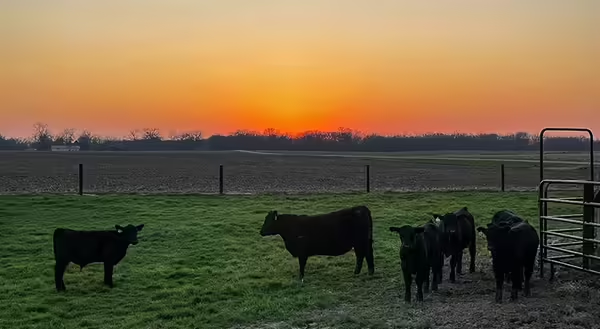
The next installment of my tri-county farmer interview series brought me to Panther Ridge Farms, owned and operated by Ashley and Nathan Hodel. Their farm, in El Paso, IL, spans 23 acres and is surrounded by the rolling hills and valleys of the Mackinaw River watershed.
Ashley and Nathan, along with their three sons Braylen, Brooks, and Briggs, currently raise 100% Angus beef cattle, broiler chickens, and laying hens. They operate a farm store on their premises and manage a small but growing Christmas tree plantation. They built their home in 2018, got their first beef cattle in 2019, and started their farm business in 2020. Since then, they haven't looked back.
Farm family roots shorten farm business learning curve
Both Ashley and Nathan had some idea of what to expect when they started their farm business. Ashley’s dad farmed conventional grain and had livestock, while Nathan’s dad raised hogs and his uncle managed grain farms. “I married the farmer’s daughter and was thrilled to continue to work on a family farm,” Nathan said. Currently, he assists with Ashley’s family grain operation, in addition to operating his own business, Panther Ridge Farms.
When they bought the land, both realized they had a livestock background, the space to have their own animals, and three boys who could do chores! “We thought that would give them something constructive to do, helping with the beef – and we enjoyed raising beef, so we kept doing it.”
Scarcity prompts diversification
I asked about their transition from offering only beef to offering both beef, eggs, and now poultry. “We go through a lot of eggs – our boys love eggs!” explained Ashley. “Early on in 2020 at the start of the pandemic, there were limits on how many cartons of eggs we could buy at the store, and we needed more than that per week.” It was the perfect motivator for them to add eggs to their product offerings!
Nathan had a hard time containing his laughter when Ashley mentioned her specific requirements for the eggs. “The thing is that I like my eggs to look a certain way,” Ashley said with a smirk. “They have to be white, have a dark yoke, but not too dark!” She explained that in her opinion, brown eggs have darker yolks and a taste difference that she does not prefer.
“Eventually we found that white leghorns laid white eggs that checked all the boxes,” said Nathan. They loaded up on leghorn hatchlings in spring of 2021, and soon “we had eggs that looked like store-bought eggs and tasted much better. They were perfect,” said Ashley. The parents shared that their kids refuse to go on vacation now unless they can bring their own eggs with them!
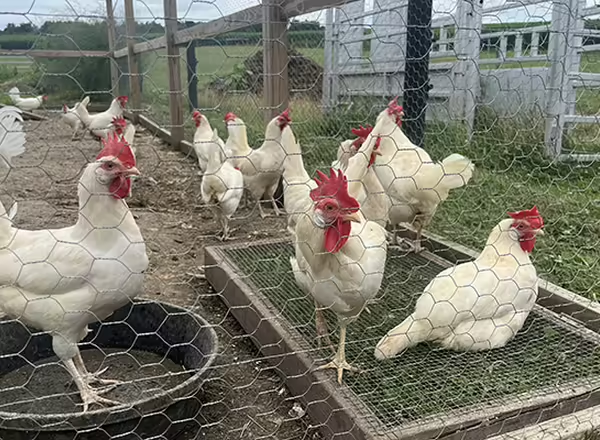
Customer requests fuel further diversification
Eventually, customers at Panther Ridge Farms who ordered ¼ or ½ freezer beef started asking about purchasing individual steaks or roasts, and even requested chicken. To meet these emerging demands, Ashley obtained her meat broker’s license in 2022. That spring, they welcomed their first batch of broiler chickens onto the farm. “We get our birds a couple times a year from Hoover Hatchery in Iowa,” Nathan shared. By late fall of the same year, their first steaks and chicken breasts were available for sale in their farm store freezer and elsewhere.
In search of prime grade beef
Since Panther Ridge Farm’s first product was beef, I wanted to learn more about their beef genetics, specific feed regimen, how the reaction to their beef has been, and what they’ve learned thus far.
“We raise 100% Angus beef. Up to this year, we’d been buying in feeder calves, but this year we decided to start raising our own,” said Nathan. He explained his whole feed process for me. “At 3 months, the calves start getting a creep feed ration (offering supplemental feed to still-nursing calves), which jumpstarts their development. At 6 months, we wean them and start them on a high-starch, high-protein diet until they’re 8 months old. After that, we introduce cracked corn, DDG (dried distiller’s grain), and free choice hay until they turn 1 year old. From 12 to 16 months, they get free choice hay and a grain ration to finish them out and add nice marbling.”
Helpful online mentors and resources improve learning curve
Nathan explained that he found a specific formula for raising their beef cattle after joining a Facebook group called "Cattle Feeders, Stockers, and Cow/Calf Discussion." He had a goal of hitting prime grade beef because he wants to offer the best possible product to his community.
Nathan elaborated that he’s found a mentor in Texas who raises 100% prime-grade beef. The rancher was kind enough to share their beef regimen with Nathan in several conversations. “One thing that this Texas rancher said to me that’s really stuck with me was, “You can only feed to the potential of the cow’s genetics.” We both reflected on social media groups like the Cattle Feeders group which can greatly improve a farmer’s learning curve, given the right connection at the right time.
Poultry processing bottleneck in Central Illinois
While their beef model seems to be mostly worked out, I wanted to know more about their poultry situation. Ashley obliged. “We’ve had issues with predators in the past so both our broilers and our egg-layers are raised mostly in our barns, where they are nice and cool, and have access to a caged outdoor grassy area. We’d love to get to the point soon where we can have them out on pasture, but we are not there yet – we don’t have enough fenced in pasture for the beef cattle and the birds, plus we are still learning how to avoid predation of the birds.”
Every couple of months, a new batch of broiler chicks arrives at Panther Ridge Farms. They go into the brooder for a couple days, then they’re on full feed for two weeks. From there, they are moved into the barns where they receive 12 hours of feed and 12 hours off. After 7-8 weeks, it’s time for processing!
“I take one of our three boys with me down to Central Illinois Poultry Processing in Arthur, drop off the birds, and we make a day of it. We go to some shops, get lunch, and the processor gives us our birds back fresh! Once home, we get the birds on ice in our barns,” Nathan shared.
I used to think that processors gave back farmers’ meat products frozen, but Nathan corrected me. “Once they’re cooled down, it’s into the freezer for them. The slow cool down, we found, leads to the best possible quality of meat,” Nathan said. Nathan and I are both fathers, and he mentioned his favorite part of the whole meat bird project is “the short but sweet one-on-one, father-son time on processing day.”
When I discovered the Hodels send their poultry all the way to Arthur for processing, we discussed the bottleneck in Central Illinois poultry processing. “If anything happened to that processor, what would Panther Ridge do?” I asked. “Drive a lot farther!” said Nathan. I did a quick internet search for the nearest poultry processor besides Arthur. It is in Rock Falls, about 2 hours away!
We agreed that there is an opportunity for a meat science professional or team of professionals in the Central/North-Central Illinois region to establish a successful business. Many farmers we know rely on the same processor in Arthur. “Over-dependence on certain products and supply chains is part of what sent our business in this direction in the first place,” added Ashley, steering our conversation back to farm product offerings. Panther Ridge Farms now offers drumsticks, wings, thighs, and breasts, in addition to whole chickens.
Asked about the popularity of their meat products, the couple shared that the beef and poultry have been moving quickly. “We have developed a little bit of a following and the reception to our quality of product has been excellent,” Nathan pronounced.
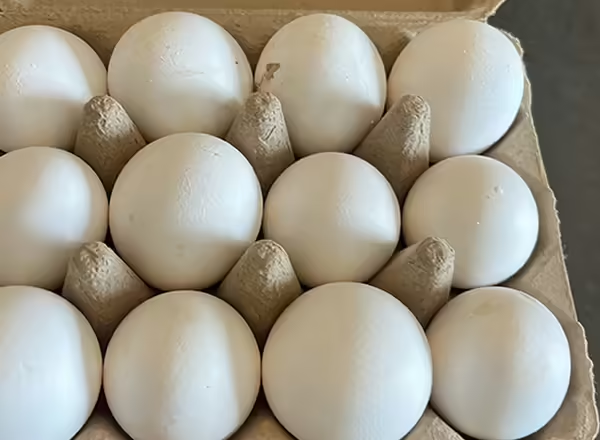
Many moving parts and multiple responsibilities
Besides being one of the owner-operators of the farm, Ashley works as a nurse at a regional hospital and has been doing so for over 20 years. On top of that, she has been doing photography work on the side “for friends’ engagements, weddings, and other life milestones of family members, neighbors, and local clients. I love it – but I’m cutting back on that!”
One of the most distinctive features of Panther Ridge Farms is the wide variety of unique and eye-catching home decoration items available alongside their beef and poultry products.
Ashley and her mother-in-law have created a small but growing following among regional interior decor enthusiasts. “That’s not something you see every day available for sale from a farm store!” I noted. Nathan praised Ashley for her skills, saying. “She is very good at what she does. She and my mother make a great team. But it takes a village to make this happen – we couldn’t do all this on our own.” Both sets of in-laws live nearby, and Nathan admitted, “There is no way we could pull off the business if it was anywhere else but at our home!”
Nathan and Ashley prioritize both their organization and family every day, and it shows. Thanks to a laser-based alarm system installed on their driveway, Ashley can manage inventory in the kitchen while making lunch for the kids or helping them with their projects. She can also be available to help customers when needed. “I get an alert on my phone when a customer rolls up so we can assist them, and then get back to it!”
The next generation of Panther Ridge Farms take the laying hen reins
Speaking of their three boys, I wanted to know what part they played in all this. Ashley explained that Braylen, Brooks, and Briggs oversee the laying hen operation. “When we added the laying hens, we knew that we wanted our boys to learn money skills. They’re in charge of purchasing the feed, caring for the birds, tracking egg sales, and they share their earnings. Nathan goes and gets the feed with them, but it comes out of their joint money”. Nathan commented, “we gave them some seed capital to purchase the first layers, and since then, they’ve really run with the project!” It seems like managing the laying hens has instilled some valuable life lessons, such as the rewards of hard work, the importance of teamwork, and the true value of a dollar.
Nathan and Ashley noted the differences between the unique skill sets of their kids are starting to come out. “Braylen really likes the challenging cerebral tasks!” He is now managing much of the family business inventory tracking system. “We had to correct his work sometimes in the beginning, but he’s really gotten the hang of it now,” said Ashley. Nathan’s final comment on the topic was amusing. “I’m a detail-oriented guy. I like things in the system to have capital letters at the beginning, correct spacing, etcetera. Oftentimes now if there are little mistakes, or something isn’t capitalized, it turns out it was Ashley that did inventory that day, not Braylen!”
Ashley continued. “Braylen does contribute besides inventory management, actually – he mows the Christmas trees every week which is about 4-5 hours of work. That’s 4-5 hours a week that Nathan or I get back to work on other tasks – which is huge.”
Christmas trees in Woodford County
My two brothers and I grew up cutting down our own Christmas tree with our parents every early December in Northern Illinois, at Richardson’s Tree Farm in McHenry County, IL. I was thrilled to learn that Panther Ridge Farms is planning to offer U-Cut Christmas trees to their visitors. I told Ashley and Nathan about my experience of cutting a tree in the snow, carrying it to the farm shop, and enjoying hot cocoa while warming up our hands. Sometimes, we even got treats on the way out, or ornaments for our tree. It turns out that the memory I had described to my hosts was very similar to what they are planning for their farm.
“We planted the first 500 Christmas trees in 2021, another 500 in 2022, and 2100 trees were planted in 2023,” Nathan shared. For Ashley, there is no better time of the year than the holiday season, especially Christmas. “I watch a lot of Hallmark movies, and I love to see other people happy!” The couple notes there is no farm business in their area running a winter agritourism operation, and they believe they’ve found a niche they can grow into.
Not an overnight addition
Based on their calculations, the first trees won’t be ready to cut until 2029 or 2030. They have about 3000 live trees in the ground right now, but it takes time to get established and grow to the height and size that most customers want for their Christmas living rooms. However, they’re not twiddling their thumbs and waiting around.
“We did have some pre-cut trees for folks to buy last year just to try and start getting our name out there that this is our vision for the farm’s future,” revealed Nathan. Ashley continued, “We had our first ever Christmas open house event last year which was a great success. We had coffee and décor for sale, live music, picture-taking, and shopping – plus a bonfire!” Panther Ridge Farms is having the same event again this year on November 23rd. “We’d love to see people come out for that!” exclaimed Nathan.
Diversification in product offerings builds resilience, sustainability, excitement
I was starting to gain a better understanding of Ashley and Nathan’s farm business journey. They began with beef, added eggs, then meat birds, and later home decorations. More recently, they have included Christmas trees and winter agritourism experiences. I wondered if there were more plans in the pipeline. “As we wait for Christmas, we thought it might be fun to add a fall-season offering or two in our lineup,” Nathan told me. I learned that a neighbor of theirs will be growing mums and pumpkins for them, selling them through Panther Ridge Farms events and their farm store.
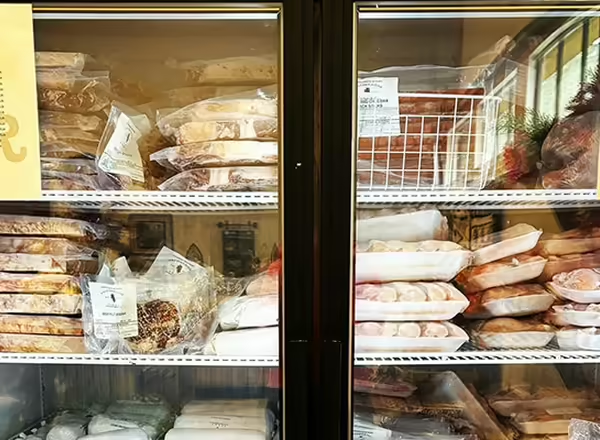
Farm business goals
With all that Nathan and Ashley had shared with me, my head was starting to spin. All this in addition to grain-farming responsibilities for Nate, nursing and photography to-dos for Ashley, and three boys to feed and parent. I asked, “Is there any interest in making Panther Ridge Farms the full-time focus of the family eventually, for ease of time management?”
“I don’t think Ashley will want to ever quit her hospital job. 20 years into it, she’s in a great spot now,” said Nathan. Ashley added, “the staff know what we are building up to here, and that there may come a time when I might have to let some other things go. But the photography would go before nursing!” Nathan shared that he also enjoys grain-farming and doesn’t mind wearing multiple hats.
I dug a little deeper. “If going full-time with the Panther Ridge Farms entity isn’t the goal, what is the long-term goal?” I asked. The couple’s answer was unanimous, and two quotes stood out to me.
“The whole reason we started Panther Ridge was to be together and to do something long-term, as a family. Don’t’ get me wrong, sometimes the boys are inside goofing around and we’re out working, but that’s happening less and less.” – Ashley
“We wanted to build and keep that tight-knit family structure. It’s the togetherness for me. What fills my cup is on some random Saturday, we might be out doing projects – I’m cutting boards, one of the boys is nailing the board up, I’m looking around and I’m proud. Don’t’ get me wrong, it’s stressful sometimes. But hopefully we’ll all look back on this time fondly.” – Nathan
Keeping calm in the face of daily, weekly farm pressures
As I got to know Ashley and Nathan, we shared stories about how we relax with our family members when things get tough during the season. “Evenings we try to keep for our family – we always have family dinner – that’s so important to us.” Ashley, Nathan and I shared that the age of the family dinner seemed threatened for a while and still is, but people involved in the local food scene are trying to keep it going and keep it sacred as much as possible.
Ashley added that she likes to manage business inventory late at night for peace of mind. “I like looking at things when it’s quiet. It’s a calming time for me, when everyone is asleep, and I can do some deep thinking!”
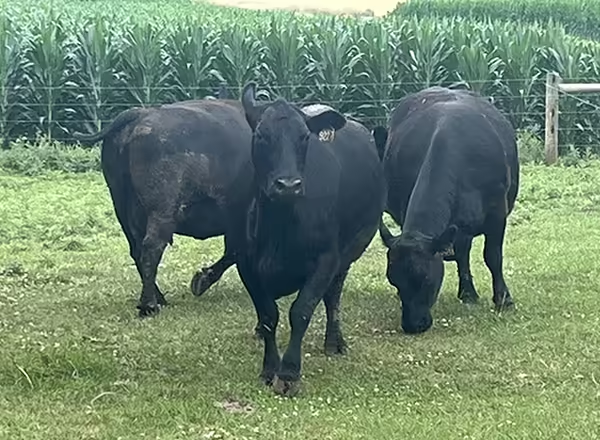
4-H inspires real-world project with special family significance
As an Illinois Extension employee, I’m always interested to know farmers’ perceptions of our organization and what more we might be able to do to support our communities we serve.
“What has been your experience with Illinois Extension or with 4-H?” I asked them. The couple shared that there were both in 4-H. “Both our dads raised hogs so we both showed pigs” Nathan added, “Braylen did 4-H for two years, but we took this year off.” Between family members’ marriages, a trip to California, and the opening of the farm shop just this year, it was too much. “Our experiences with Livingston and Woodford County 4-H have been fantastic.” said Ashley. Nathan said, “4-H was great, but now we have many of those activities happening at home through Panther Ridge Farms! We are not struggling for things for the boys to do any more.”
Farmer-Extension Educator brainstorm leads to future program ideas for farm business owners
The Hodels didn’t have much experience with Illinois Extension beyond 4-H. Once I explained more about what we have to offer to farm business families like theirs, we came up with some ideas. “A class taught by farmers that are successfully using social media to advertise their products would be amazing,” Ashley shared. “When you farm, you wear so many hats. We are our own feed guys, laborers, business managers, etc. It’s hard to do it all!” She continued, “how many posts should I make per week? What time of day? Is there an easy way to make a reel? It’s intimidating. We want to promote ourselves, but we don’t want to come off as braggy or dramatic.”
When I got back to the office later, I reached out to a farmer who met the criteria that Ashley laid out, who has a great social media presence for her farm business. We plan to offer this program to other small farm business owners within the year! I thanked Ashley for her suggestion.
Lessons learned and paying it forward to the next generation
I asked Nathan and Ashley what advice they would give to their past selves at the start of their farm business journey. I also noticed that their answers could be used as general advice for people pursuing just about any individual passion project.
Nathan: “I’d say – be patient. When I have a goal or a vision, I just want to be there. But the grind is an important part of the journey. Knowing that it will be chaotic within the stages of growth is just a cold, hard reality. Keep a slow steady pace at it, and don’t get overwhelmed.”
Ashley: “Take the risk, it’s worth it. If you have a vision, go for it – don’t worry too much about whether people will like it or not. Have confidence and try your best. Don’t be afraid to figure it out along the way. The scariest part is starting out.”
Before we concluded, I gave Ashley and Nathan an opportunity to share anything else with our readers that they considered important to their story. Nathan was the first to respond.
“We are very faith-based. We feel like God has given us the ability and the wherewithal to do all this. That’s what I’m the most passionate about. That’s why we love Christmas, that’s why we love doing this. That’s my silver lining for it all.”
He elaborated that everyone is given some sort of talent, and life is about finding and using it. “Ashley has a gift for taking care of people. Nick, you have a talent for helping people tell their story. Our family’s gift is something that we are trying to share with as many people as possible. Hard work ethic, family activities, spending time together, quality farm products to feed people.
Interested individuals can purchase Panther Ridge Farm’s products at Caleri’s Café and Bakery in Roanoke, Farm Family Foods in Benson, and at the family’s farm during business hours as found on their Facebook page (subject to change).